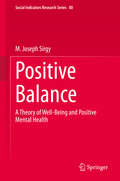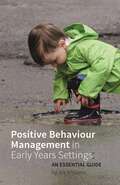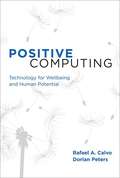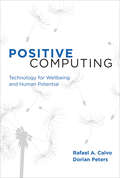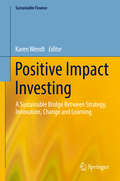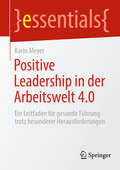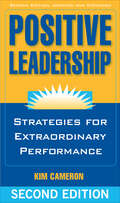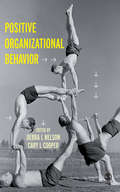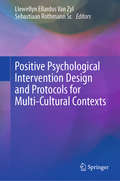- Table View
- List View
Positive Balance: A Theory of Well-Being and Positive Mental Health (Social Indicators Research Series #80)
by M. Joseph SirgyThe book provides a new theory of well-being designed to integrate many disparate concepts of well-being, such as subjective well-being, personal happiness, mental well-being, emotional well-being, psychological well-being, hedonic well-being, social well-being, life satisfaction, domain satisfaction, and eudaimonia. It lays the foundation for a new a theory of mental well-being based on a hierarchical perspective of positive mental health and guided by the concept of positive balance.Written by a well-known expert in the field, this book addresses the issue of positive balance related to physiological, emotional, cognitive, meta-cognitive, developmental and social-ecological levels of an individual and analyses the factors at each level that contribute to an individual’s positive mental health experience. It discusses in detail the effects of neurochemicals such as dopamine, serotonin, or cortisol; positive and negative affect; satisfaction in salient and multiple life domains vis-à-vis dissatisfaction in life domains; positive versus negative evaluations about one’s life using certain standards of comparison; positive psychological traits of personal growth and intrinsic motivation, etc. vis-à-vis negative traits like pessimism and impulsiveness; and perceived social resources like social contribution and social actualization vis-à-vis perceived constraints like exclusion and ostracism. This original work is of interest to students, researchers and practitioners of quality of life and wellbeing studies, positive psychology, developmental psychology and mental health..
Positive Behaviour Management in Early Years Settings: An Essential Guide
by Liz WilliamsDrawing on her extensive practical experience, Liz Williams provides a highly accessible and much-needed guide to promoting positive behaviour in early years settings. In this book, she explains why children may act in the way that they do and how behaviour should be understood differently in children of different ages. She demonstrates that social and emotional capacities differ greatly in these crucial development years and how this impacts on the support needed at each stage. The book considers a host of factors influencing positive behaviour, such as environments and the importance of planning, and looks beyond the child to show the vital role that staff and parents have in promoting appropriate behaviour. Written in clear and understandable language, this book is full of ideas that early years workers can easily implement in their day-to-day work.
Positive Behaviour Management in Primary Schools: An Essential Guide
by Liz WilliamsThis highly accessible and much-needed resource sets out practical advice on positive behaviour management in primary schools, exploring how to support children effectively with their personal, social and emotional development. With an emphasis on implementable strategies, this book will give primary school teachers and staff an understanding as to why children may behave as they do, and what steps can be taken by the school to support a child's development. Considering a variety of factors that influence positive behaviour, such as environment, mental health, parents, and the importance of planning, this book is full of ideas that can be dipped in and out of for support in the classroom. Bite-sized and practical, this is a perfect book for busy teachers.
Positive Computing
by Rafael A. Calvo Dorian PetersOn the eve of Google's IPO in 2004, Larry Page and Sergey Brin vowed not to be evil. Today, a growing number of technologists would go further, trying to ensure that their work actively improves people's lives. Technology, so pervasive and ubiquitous, has the capacity to increase stress and suffering; but it also has the less-heralded potential to improve the well-being of individuals, society, and the planet. In this book, Rafael Calvo and Dorian Peters investigate what they term "positive computing" -- the design and development of technology to support psychological well-being and human potential. Calvo and Peters explain that technologists' growing interest in social good is part of a larger public concern about how our digital experience affects our emotions and our quality of life -- which itself reflects an emerging focus on humanistic values in many different disciplines. Synthesizing theory, knowledge, and empirical methodologies from a variety of fields, they offer a rigorous and coherent foundational framework for positive computing. Sidebars by experts from psychology, neuroscience, human--computer interaction, and other disciplines supply essential context. Calvo and Peters examine specific well-being factors, including positive emotions, self-awareness, mindfulness, empathy, and compassion, and explore how technology can support these factors. Finally, they offer suggestions for future research and funding.SidebarsTimothy N. Bickmore, Jeremy Bailenson, danah boyd, Jane Burns, David R. Caruso, Mihaly Csikszentmihalyi, Felicia Huppert, Mary-Helen Immordino-Yang, Adele Krusche and J. Mark G. Williams, Jane McGonigal, Jonathan Nicholas, Don Norman, Yvonne Rogers
Positive Computing: Technology for Wellbeing and Human Potential
by Rafael A. Calvo Dorian PetersA case for building a digital environment that can make us happier and healthier, not just more productive, and a theoretical framework for doing so.On the eve of Google's IPO in 2004, Larry Page and Sergey Brin vowed not to be evil. Today, a growing number of technologists would go further, trying to ensure that their work actively improves people's lives. Technology, so pervasive and ubiquitous, has the capacity to increase stress and suffering; but it also has the less-heralded potential to improve the well-being of individuals, society, and the planet. In this book, Rafael Calvo and Dorian Peters investigate what they term “positive computing”—the design and development of technology to support psychological well-being and human potential. Calvo and Peters explain that technologists' growing interest in social good is part of a larger public concern about how our digital experience affects our emotions and our quality of life—which itself reflects an emerging focus on humanistic values in many different disciplines. Synthesizing theory, knowledge, and empirical methodologies from a variety of fields, they offer a rigorous and coherent foundational framework for positive computing. Sidebars by experts from psychology, neuroscience, human–computer interaction, and other disciplines supply essential context. Calvo and Peters examine specific well-being factors, including positive emotions, self-awareness, mindfulness, empathy, and compassion, and explore how technology can support these factors. Finally, they offer suggestions for future research and funding.SidebarsTimothy N. Bickmore, Jeremy Bailenson, danah boyd, Jane Burns, David R. Caruso, Mihaly Csikszentmihalyi, Felicia Huppert, Mary-Helen Immordino-Yang, Adele Krusche and J. Mark G. Williams, Jane McGonigal, Jonathan Nicholas, Don Norman, Yvonne Rogers
Positive Impact Investing: A Sustainable Bridge Between Strategy, Innovation, Change and Learning (Sustainable Finance)
by Karen WendtThis book illustrates the impact that a focus on environmental and social issues has on both de-risking assets and fostering innovation. Including impact as a new cornerstone of the investment triangle requires investors and clients to align interests and values and understand needs. This alignment process functions as a catalyst for transforming organizational culture within an organization and therefore initiates the external impact of the organization, but also its internal transformation, which in turn escalates the creation of impact. Describing how culture is the social glue permeating all disciplines of an organization, the book demonstrates how organizational alignment can be achieved in order to allow strategic speed, innovation and learning, and provides examples of how impact can be achieved and staff mobilized It particularly focuses on impact investing, impact entrepreneurship, innovation, de-risking asset, green investment solutions and investor movements to counteract climate change and implementing the United Nations Sustainable Development Goals, highlighting culture, communication, and strategy.
Positive Interaction Skills: A Group Therapy Manual
by Robin DynesThis practical, photocopiable manual provides group leaders with a flexible programme to teach interaction skills that can be adapted to a wide variety of groups, situations and needs. The programme will benefit anyone who lacks adequate skills or who has difficulty interacting with other people at home, socially or at work, for example adults with very few or no formal qualifications, people with depression or schizophrenia, young people in schools or people with learning disabilities. The book is filled with workable ideas and the sessions are designed to be used independently as required to meet identified needs. Full guidance notes for facilitators, session plans, handouts and activity guidelines are provided and this will be an invaluable resource for anyone wanting to run an interaction skills programme.
Positive Leadership in der Arbeitswelt 4.0: Ein Leitfaden für gesunde Führung trotz besonderer Herausforderungen (essentials)
by Karin Meyer„Immer mehr, schneller und mit möglichst geringen Ressourcen“ lautet oftmals die Devise in der Arbeitswelt 4.0. Dabei ist es möglich, Unternehmens- und Mitarbeiterinteressen bestmöglich zu vereinen – also, Unternehmen (noch) erfolgreicher zu machen und gleichzeitig Wohlbefinden und Gesundheit der Mitarbeitenden zu stärken. Denn ökonomisches und soziales Wohlergehen können sich sinnvoll komplementär ergänzen. Beleuchtet werden daher wesentliche Grundlagen für Wohlbefinden, Gesundheit und unternehmerischen Erfolg – ebenso wie die Umsetzung in die Praxis mittels Positive Leadership gelingen kann.
Positive Leadership: Strategies for Extraordinary Performance
by Kim CameronUpdated Edition: &“Translates years of social science research into actionable guidelines for leaders who wish to make a positive difference in the world.&” —Amy C. Edmondson, Novartis Professor of Leadership and Management, Harvard Business SchoolPositive Leadership shows how to reach beyond ordinary success to achieve extraordinary effectiveness, spectacular results, and what Kim Cameron calls &“positively deviant performance&”—performance far above the norm. Citing a wide range of research in organizational behavior, medical science, and psychology as well as real-world examples, Cameron shows that to achieve exceptional success, leaders must emphasize strengths rather than simply focus on weaknesses; foster virtuous actions such as compassion, gratitude, and forgiveness; encourage contribution goals in addition to achievement goals; and enable meaningfulness in work. In this concise, inspiring, and practical guide, Cameron describes four positive leadership strategies, lays out a proven process for implementing them, and includes a self-assessment instrument. This second edition has been updated throughout with new research findings and new ideas for implementing positive leadership.
Positive Leisure Science
by Teresa FreireThis book extends positive psychology by embedding leisure into the positive science field, following a new paradigm and aggregating various domains and fields. Positive science can be applied to the field of leisure and, in turn, leisure can serve as an arena to study some of the most important optimal functioning variables. The book presents knowledge on a diverse range of topics about optimizing socio-cognitive processes and behaviors, places and contexts, societies and cultures through leisure. These topics are unified by an underlying continuum that extends from individuals and subjective experiences to social worlds. The contributions highlight components of everyday life, showing that subjective experience and life trajectories are structured and social goals and life purposes are defined and achieved within interactions between individuals and their lived contexts and environments in daily life. .
Positive Nations and Communities: Collective, Qualitative and Cultural-Sensitive Processes in Positive Psychology
by Luis Miguel Neto Helena Águeda MarujoThis book approaches the field of positive psychology from a post-modern perspective. It explores the consequences of combining current trends and models with supplementary participatory and transformative methods. The book brings a more collective, qualitative, culturally sensitive and transformative approach to the processes of making sense and implementing the science of positive psychology. It moves beyond the individual level towards a "knowledge community" and "knowledge of the communities". The book is an invitation to more participatory and polyphonic dialogues in the field of positive psychology.
Positive Organizational Behavior
by Cary L. Cooper Debra NelsonPositive Organizational Behaviour is emerging as a truly contemporary movement within the classic discipline of organizational behaviour. The best work of leading scholars is gathered together in one edited collection. Chapters study the states, traits and processes that compromise this exciting new science. In addition to mapping the field, this collection goes one step further and invites noted experts to identify the methodological challenges facing scholars of Positive Organizational Behaviour. Positive Organizational Behaviour constitutes the study of positive human strengths and competencies, how it can be facilitated, assessed and managed to improve performace in the workplace . Its roots are firmly within positive psychology but transplanted to the world of work and organizations. This book showcases the cutting edge of this an exciting and challenging new area within Organizational Behaviour. It should be read by anyone who is interested in extending their knowledge of this field. Debra Nelson has a website at http:/www.nelsonquickgroup.com
Positive Organizational Behaviour: A Reflective Approach
by Stewart Clegg Miguel Pina Cunha Arménio Rego Ace SimpsonPositive Organizational Behaviour: A Reflective Approach introduces the most recent theoretical and empirical insights on positive organizational practices, addressing emerging topics such as resilience, job crafting, responsible leadership and mindfulness. Other books on positive approaches tend to gloss over the limitations of the positive agenda, but this textbook is unique in taking a reflective approach, focussing on the positive while also accommodating critical perspectives relating to power and control. Positive Organizational Behaviour provides an integrated conceptual framework, evidence-based findings and practical tools to gain an understanding of the potential of positive organizational practices. This innovative new textbook will provide advanced management and psychology students with a grounding in the area, and help them develop strategies for building effective and responsible organizations.
Positive Organizational Scholarship: Foundations of a New Discipline
by Kim S. Cameron Jane E. Dutton Robert E. QuinnGratitude and other positive emotions are not generally discussed in regard to organizations. Based on the first conference in this new field held at the U. of Michigan, with which Cameron (organizational behavior and human resource management) is affiliated, contributors to 23 chapters describe empirical and theoretical facets of this emerging discipline focusing on individual and management strengths driving exceptional performance.
Positive Organizing: Organisationskompetenz für die Begleitung von Veränderungsprozessen (Positive Psychologie kompakt)
by Eva SchieleinVermittelt Ihnen Grundkenntnisse der systemischen Organisationstheorie für eine wirksame Begleitung von organisationalen Veränderungsprozessen. Mit Konzepten, die auf Menschen und ihre Psychodynamiken fokussieren, kommt man bei der Arbeit mit Organisationen nicht weit. Statt über die Grenzen der Positiven Psychologie zu lamentieren, verknüpft dieses Buch den potenzialorientierten Ansatz des Positive Organizational Scholarship (POS) mit Grundlagen der systemischen Organisationstheorie, um Transformationen in Organisationen wirksam zu begleiten. Während sich mit ‚Positive Leadership‘ bereits vor Jahren ein radikal neues Verständnis von Führung etabliert hat, definiert ‚Positive Organizing‘ den Prozess des Organisierens neu. Positive Organizing wird als Prozessmodell vorgestellt, das Berater:innen und Führungskräfte einsetzen können, um Organisationen in ihrer Fähigkeit zu stärken, selbstorganisiert und potenzialorientiert Veränderungen zu bewirken. Zu den Zielgruppen: Führungskräfte, Berater:innen, Coaches, und alle, die Veränderungen in Organisationen begleiten.
Positive Prospects: Careers for social science graduates and why number and data skills matter
by Campaign for Social ScienceAlmost four in ten graduates studied one of the social sciences. Where do they go to work? How do their employment and earnings compare to those who graduate from other areas? What makes a difference to their employment chances? Positive Prospects provides a brief description of employment after graduation for those who study a wide range of social science subjects, using up-to-date information. The report gathers evidence from many sources about longer-term prospects and the backgrounds of ‘world leaders’. It shows that there is variation between those graduating from different social science disciplines, as there is with so-called STEM (science, technology, engineering and maths) graduates. Positive Prospects takes a look at the effect of graduating from different types of university, while observing that this reflects a great many factors such as students’ backgrounds and where they live and study. One clear theme is that having number and data skills – either from secondary school or as part of undergraduate study – is likely to give individuals of every discipline a wider range of choices about work, meaning they are likely to earn more. Needless to say number and data skills are not the only things that matter, nor do all social science students need the same skill level. But the Campaign for Social Science has long believed that we need more people with conceptual social science skills and knowledge combined with some number and data skills – Positive Prospects shows that this combination has clear benefits. The Campaign has also prepared summaries aimed specifically at undergraduates, schools, and school students.
Positive Psychological Approaches to Disaster: Meaning, Resilience, and Posttraumatic Growth
by Stefan E. SchulenbergWritten by prominent proponents of disaster mental health and/or positive psychology, this comprehensive book examines disaster mental health and positive psychology in the context of natural and technological disasters. Chapters in the first section focus on applications of meaning and resilience in the area of disaster mental health, both serving as primary examples of applications of positive psychology and related frameworks. Later chapters focus more specifically on key aspects of disaster mental health, including the importance of preparedness, training, and special populations. Contributors consistently align their insights with positive psychological approaches, either by explicitly referencing their relevance or alluding less directly to themes in positive psychology.Among the topics discussed:The role of religion and spirituality in finding meaning after disastersVeterans and disaster response workFirefighters: an occupational case study of resilienceStrategies for responding to adolescents following natural and technological disastersEffective crisis response for facilitating posttraumatic growthPositive Psychological Approaches to Disaster: Meaning, Resilience, and Posttraumatic Growth is a significant and timely collection of research, representing an effort of internationally respected scholars in positive psychology and disaster mental health.
Positive Psychological Intervention Design and Protocols for Multi-Cultural Contexts
by Llewellyn Ellardus Van Zyl Sebastiaan RothmannThis volume presents innovative and contemporary methodologies and intervention protocols for the enhancement of positive psychological attributes in multicultural professional and organizational contexts. Most methods, models and approaches that underpin positive psychological interventions are confined to clinical samples, closed systems or monocultural contexts, which restrict their applicability to particular contexts. Extensive practical intervention protocols, designs and methods which usually accompany first draft intervention papers are condensed into brief paragraphs in final manuscripts or removed in their entirety. This, in turn, reduces their potential for replicability or adoption by consumers, practitioners, or industry. This volume develops guidelines for enhancing positive psychological attributes, such as positive moods (e.g. positive affect; life satisfaction), strengths (e.g. gratitude; humour), cognitions (e.g. hope; optimism) and behaviours (e.g. emotional regulation; positive relationship building) within various multicultural contexts. Thereby, it shows how positive psychology interventions can be replicated to a wide-range of contexts beyond those in which they were developed.
Positive Psychologie - Erfolgsgarant oder Schönmalerei?
by Michael TomoffPositive Psychologie - Erfolgsgarant oder Schönmalerei? Entdecken Sie die Doppelkante der Positiven Psychologie: Ein Schlüssel zu mehr persönlichem und beruflichem Erfolg oder doch nur eine rosarote Brille? Diplom-Psychologe Michael Tomoff entführt Sie in eine Welt, die sowohl die glänzenden als auch die schattigen Seiten dieser bewegenden Wissenschaft beleuchtet. Das vorliegende Buch ist weit mehr als ein Glücksratgeber. Es ist eine fundierte, kritische und dennoch humorvolle Untersuchung der Positiven Psychologie, die sich sowohl an Lehrer, Eltern, Führungskräfte, Mitarbeiter, Coaches und auch Trainer richtet – egal ob Laien oder Experten. Mit einem klaren Blick auf die wissenschaftliche Basis und die praktische Anwendung beleuchtet der Autor die Mythen und Missverständnisse rund um die Wissenschaft des Wohlbefindens: Macht Geld glücklich? Sind Eltern zufriedener als Kinderlose? Welche Rolle spielen Schuld und Scham bei der Kindererziehung? Wie kann die Positive Psychologie die Schule oder das Unternehmen von morgen unterstützen und formen? Und sollte sie das überhaupt? Durch die elegante, mundgerechte Zusammenfassung aktueller Forschungen, die Vorstellung leicht umsetzbarer Übungen, Tools und Interventionen sowie die Erörterung der Relevanz der Positiven Psychologie in verschiedenen Kulturen und Lebensbereichen bietet dieses Buch einen umfassenden Überblick und praktische Anleitungen. Erfahren Sie, wie die Positive Psychologie in Schulen, Unternehmen und im persönlichen Leben konkret Anwendung finden kann, und welche Vorteile sie bietet. Michael Tomoff ist nicht nur ein erfahrener Psychologe, sondern auch ein leidenschaftlicher Botschafter für das Potenzial der Positiven Psychologie, das Wohlstand und Wohlbefinden zu fördern und dabei realistisch und kritisch zu bleiben. Mit seiner Ausbildung an der University of California in Berkeley und seiner breiten Erfahrung als Trainer, Berater und systemischer Coach bringt ereine einzigartige Perspektive und eine Fülle von praktischen Einsichten in dieses fesselnde Werk ein. In seinem Blog „Was Wäre Wenn“ gibt er wichtige Impulse zu einer Vielzahl von Themen wie Dankbarkeit, Komplimenten, dem Nein-Sagen, Grenzensetzen oder auch stärkenfokussierter Führung.
Positive Psychologie in Bildungseinrichtungen: Konzepte und Strategien für Fach- und Führungskräfte (essentials)
by Michaela BrohmMichaela Brohm stellt Konzepte und Strategien zur positiven Energetisierung von Individuen und Organisationen im Bildungsbereich vor. Sie zeigt, wie sich das energetische Niveau einer Bildungsorganisation durch positiv-psychologische Maßnahmen heben lässt, und gibt Impulse für einen motivierenden, Mensch und Organisation belebenden Führungsstil. Wertvolle Anregungen, inspirierende Beispiele und ein umfassendes Inventar zu den zentralen Elementen positiven Führungsverhaltens fordern zum Transfer in die Praxis heraus.
Positive Psychologie in Unternehmen: Für Führungskräfte (Essentials)
by Michael TomoffMichael Tomoff präsentiert einen Überblick über die Möglichkeiten, die der neue Wissenschaftszweig der Positiven Psychologie Unternehmen bietet. Der Autor unterstützt auch in der zweiten Auflage dieses mittlerweile zum Bestseller gewordenen Buches Führungskräfte dabei, ihre Arbeit sinnvoll zu bereichern, indem sie sowohl eigene als auch fremde Potenziale entdecken und entfalten. Damit können sie einen Mehrwert für sich, ihre Mitarbeiter und ihre Organisation schaffen.
Positive Psychologie in Unternehmen: Für Führungskräfte (essentials)
by Michael TomoffMichael Tomoff präsentiert einen Überblick über die Möglichkeiten, die der neue Wissenschaftszweig der Positiven Psychologie Unternehmen bietet. Der Autor unterstützt Führungskräfte dabei, ihre Arbeit sinnvoll zu bereichern, indem sie sowohl eigene als auch fremde Potenziale entdecken und entfalten. Damit können sie einen Mehrwert für sich, ihre Mitarbeiter und ihre Organisation schaffen.
Positive Psychologie und Führung – ein Praxisleitfaden (Positive Psychologie kompakt)
by Wolfhart PentzUnsere Erkenntnisse über gute Führung wachsen ständig. Spannende Einsichten aus der positiven Psychologie, aber auch aus der Hirnforschung, der Verhaltensökonomie oder der Gesundheitsforschung haben unseren Wissenskanon in den letzten Jahren dramatisch erweitert. Doch Wissenschaft ist nicht immer leicht verdaubar und selten direkt anwendbar. Dieses Buch schlägt eine Brücke zwischen den theoretischen Erkenntnissen der Wissenschaften und den praktischen Herausforderungen im Führungsalltag. Seine langjährigen Erfahrungen aus der Arbeit mit Führungskräften verbindet der Autor mit einer tiefen Wissenschaftsverbundenheit. Ausgehend von wichtigen Führungsaufgaben (z. B. wirksam kommunizieren, Ziele erreichen, Mitarbeiter entwickeln) sondiert er neueste Forschungsergebnisse und bringt sie verständlich auf den Punkt. Konkrete Handlungsempfehlungen sowie detaillierte Beschreibungen von praktischen Werkzeugen erleichtern den Lesenden die Anwendung.
Positive Psychologie, Kompetenzförderung und Mentale Stärke: Gesundheit, Motivation und Leistung fördern
by Ottmar L. BraunDieses Buch veranschaulicht Personalentwicklungsmaßnahmen zur Förderung von Selbstkompetenzen, Sozialkompetenzen, Methodenkompetenzen und mentaler Stärke im Rahmen der Positiven Psychologie. Im Mittelpunkt steht das Modell des Positiven Selbstmanagements mit folgenden drei großen Komponenten: Methoden und Techniken der Positiven Psychologie und Kompetenzen wie finanzielle Selbstmanagementkompetenz, Entscheidungskompetenz, Resilienztechniken, Vitalität, Kompetenzen in Smalltalk und Networking, Präsentationskompetenz, die Reduzierung dysfunktionaler Kognitionen, Problemlösekompetenz und Zielklarheit führen zur mentalen Stärke.Mentale Stärke: Diese setzt sich aus Selbstwirksamkeitserwartungen, Optimismus, Hoffnung, Resilienz, Selbstvertrauen und der Fähigkeit zur Emotionsregulation zusammen. Die mentale Stärke hat langfristig positive Folgen, u.a. gehören dazu Arbeitszufriedenheit, Lebenszufriedenheit, psychische Gesundheit, ein geringeres Stresserleben und eine geringere Tendenz zum Burnout. Basierend auf zahlreichen empirischen Studien , die das Modell belegen und die Wirksamkeit von Trainingsveranstaltungen bestätigen, erhält jeder Leser wertvolle Hinweise für das Arbeitsleben – auch bezüglich der Anwendung des Quizbrettspiels "CareerGames - spielend trainieren", das in den Trainings zur Transfersicherung zum Einsatz kam. Zielgruppen: Personalverantwortliche, Trainer, Anwender und Studierende bzw. alle diejenigen, die Selbstmanagementkompetenzen, Sozial- und Methodenkompetenzen und Mentale Stärke in Organisationen erfolgreich trainieren wollen. Zum Herausgeber: Prof. Dr. Ottmar L. Braun, Studium der Psychologie und Promotion zum Dr. phil. an der Universität Bielefeld. Derzeit Professor im Arbeitsbereich Sozial-, Umwelt und Wirtschaftspsychologie an der Universität Koblenz-Landau.
